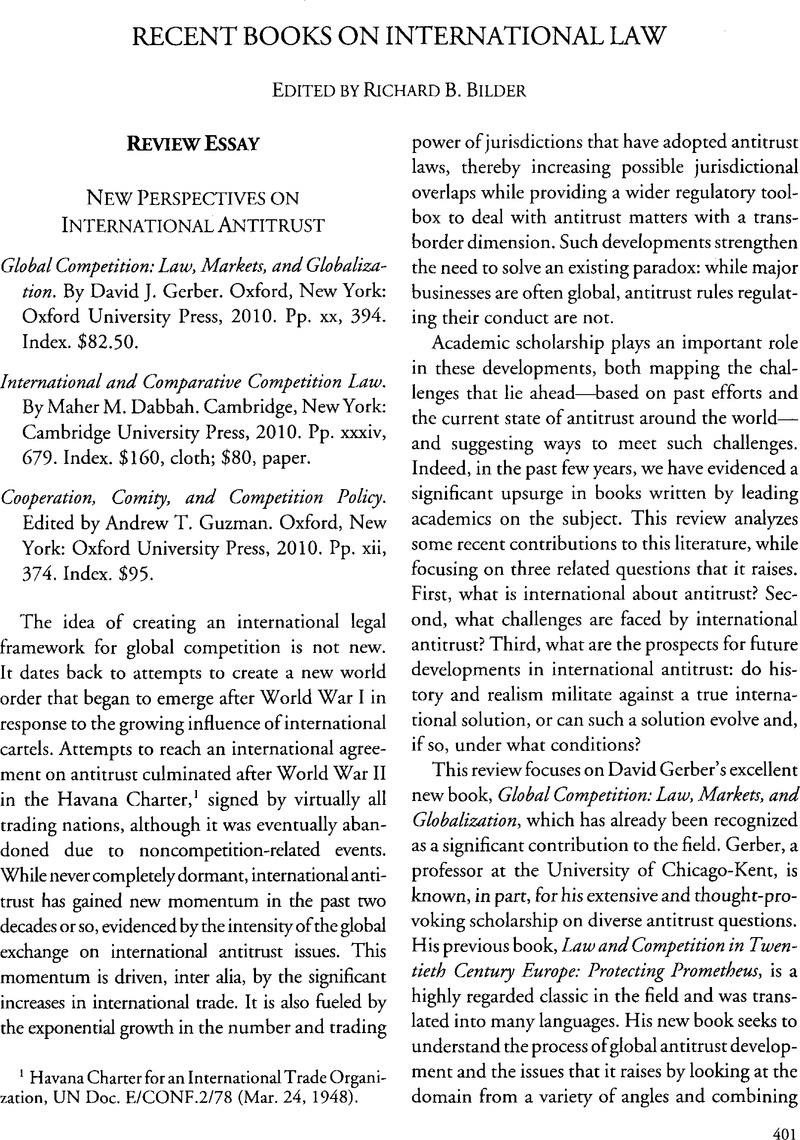No CrossRef data available.
Published online by Cambridge University Press: 20 January 2017

1 Havana Charter for an International Trade Organization, UN Doc. E/CONF.2/78 (Mar. 24, 1948).
2 Additional recent books that include a strong international antitrust dimension include Fiona Marshall, Competition Regulation and Policy at the World Trade Organisation (2010) (focusing on attempts to include antitrust through the WTO), and Anestis S. Papadopoulos, The International Dimension of EU Competition Law and Policy (2010) (studying the influence of the European Union on antitrust elsewhere). Significant contributions on this topic have also been made in journal articles. They lie, however, beyond the scope of this review.
3 This reviewer contributed a chapter on Israel to this book, but that chapter is not discussed in this review.
4 For elaboration of the access and conduct effects, see Gal, Michal S. & Padilla, A. Jorge, The Follower Phenomenon: Implications for the Design of Monopolization Rules in a Global Economy, 76 Antitrust L. J. 899, 909-12 (2010)Google Scholar.
5 One can, however, question why such an agreement was not reached among Western states, as it evolved in other areas of international trade.
6 Fox, Eleanor M., Competition, Development, and Regional Integration: In Search of a Competition Law Fit for Developing Countries, in Competition Policy and Regional Integration in Developing Countries (Bakhoum, Mor, Drexl, Josef, Fox, Eleanor M., Gal, Michal S. & Gerber, David eds., forthcoming 2012)Google Scholar.
7 Gal, Michal S., Restrictive Agreements and Unilateral Restraints, in Economic Theory And Competition Law 247 (Drexl, Josef, Idor, Laurence & Monéger, Joël eds., 2009)Google Scholar.
8 In light of such resistance, Dabbah makes several interesting suggestions: dealing with such questions solely though intergovernmental consultation and negotiation, confining the assertion of extraterritoriality to exceptional circumstances, and abandoning the remedy of treble damages in such cases.
9 Gal, Michal S., Regional Competition Law Agreements: An Important Step for Antitrust Enforcement, 60 U. Toronto L. J. 239, 258-61 (2010)CrossRefGoogle Scholar.
10 Id.
11 Id.
12 See, e.g., Mor Bakhoum & Julia Molestina, Institutional Coherence and Effectivity of a Regional Competition Policy: The Case of the West African Economic and Monetary Union (WAEMU), in Competition Policy and Regional Integration, supra note 6.
13 See, e.g., Gal, Michal S., Antitrust in a Globalized Economy: The Unique Enforcement Challenges Faced by Small and Developing jurisdictions, 33 Fordham Int’ L. J. 1 (2009)Google Scholar.